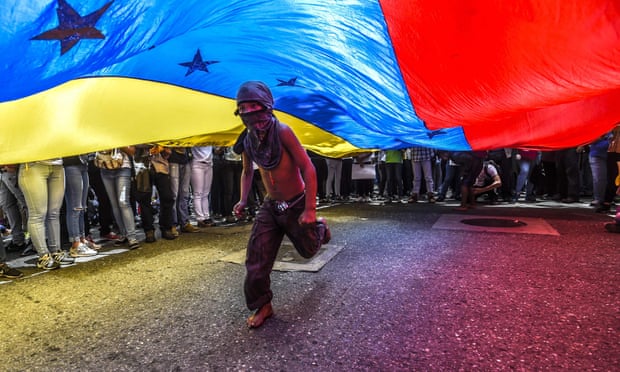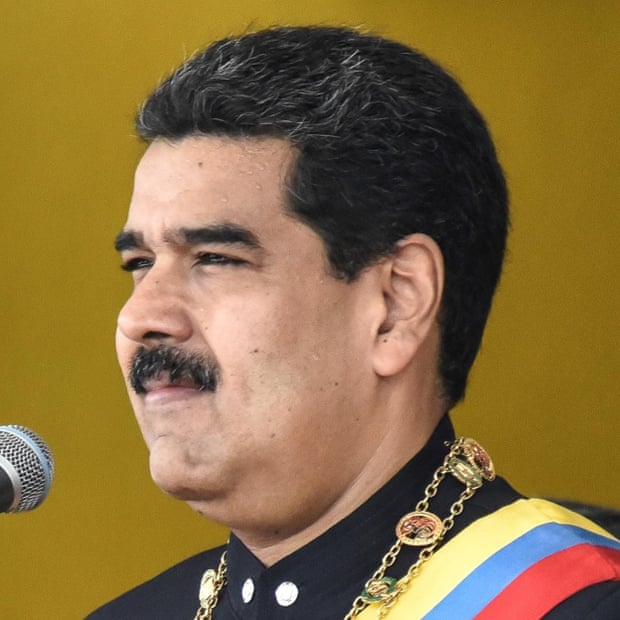Labour’s shadow foreign secretary, Emily Thornberry, has said Venezuela’s government has a duty to answer concerns about Nicolás Maduro’s “increasingly authoritarian rule”, as pressure mounted on Jeremy Corbyn to speak out.
The party leader was a longtime admirer of Venezuela under its late socialist leader Hugo Chávez, saying in 2013 he was “an inspiration to all of us fighting back against austerity and neoliberal economics in Europe”.
Quick GuideWhat's behind the Venezuelan crisis?
Show

Behind the crisis
A cratering economy and acute shortages of medicine and food, coupled with rising anger at increasingly authoritarian government have contributed to the crisis. The IMF has predicted that unemployment will surpass 25% this year, as the country suffers a third year of recession.Political turmoil
The president Nicolas Maduro won a general election in 2013, on a platform of continuing his predecessor Hugo Chávez's socialist policies of using the country's oil riches to reduce inequality and lift people out of poverty, but falling oil prices have forced the government to curtail social programmes.Recent protests
Recent protest have been sparked by a court decision – later overturned – to strip the opposition-controlled national assembly of powers, and a 15-year ban from public office imposed on opposition leader Henrique Capriles.Corbyn has also previously given his backing to Maduro, Chávez’s successor. In 2014, he rang to congratulate the new president live on a Venezuelan television channel, where Maduro introduced the Labour leader as a “friend of Venezuela”.
Thornberry’s spokesman said Labour had already called for the Venezuelan government to respect human rights and the rule of law, after the socialist government was granted sweeping powers to overhaul the country’s political system in a disputed recent poll that was boycotted by the opposition.
Security agents have since seized two opposition leaders from their homes after they called for protests against the vote. Widespread protests against the government have been going on since April amid mounting food and medicine prices driven by plunging oil prices, with more than 121 people killed in the unrest.
On Wednesday, Thornberry’s spokesman said Labour had already called for the government to respect human rights.
“Our official statement on Monday called on the Venezuelan government to respect human rights and the rule of law, said the election must not be treated as a mandate for further repression and violence, and challenged President Maduro personally to answer the legitimate concerns of the international community about his increasingly authoritarian rule,” the spokesman said. “That remains the Labour party’s position today.”
ProfileWho is Nicolás Maduro?
Show

Political career
Nicolás Maduro has ruled Venezuela without two of the greatest assets possessed by his mentor and predecessor, Hugo Chávez. He has not been lucky. And he has no charisma.
Chávez enjoyed an oil bounty and sublime political talents that secured his power at home and reputation abroad.
Maduro, in contrast, inherited a wobbling economy addicted to high oil prices and a system of authoritarian populism dependent on showmanship and patronage. Oil prices tumbled and Maduro proved to be a fumbling showman, exposing the financial ineptitude and ideological hollowness of the “Bolivarian revolution”.
This could have doomed his presidency, which began in 2013 after Chávez died, but the former bus driver, a hulking bear of a man who rose up trade union ranks, turned out to be tenacious and ruthless.
Born into a working class family in Caracas in 1962, he left school without graduating and drove buses for the Caracas metro. He became a union organiser and early supporter of Chávez, who, after leading a failed coup, led a leftwing coalition to an electoral landslide in 1998.
Maduro was the speaker of the assembly before serving as Chávez’s foreign minister from 2006 to 2013, a visible if largely silent presence as the comandante held court on the world stage. Chávez anointed Maduro as his heir before succumbing to cancer.
The story of his rule – and Venezuela’s agony – is a determination to keep power amid economic collapse, humanitarian disaster and international condemnation. Since January 2019 his presidency has been disputed, with Juan Guaidó being sworn in as interim president, and recognised as Venezuela’s ruler by some international powers.
Crisis after crisis has buffeted his government – hyperinflation, food and medicine shortages, power blackouts, mass protests, drone attacks, defections, US-led sanctions – and Maduro has remained standing, resolute, implacable.
It is a remarkable position for a man who, in a 2014 Guardian interview, described himself as a bit of a hippy and a fan of Led Zeppelin and John Lennon.
“I never aspired to be president,” he said. “I always honour something that commander Chávez told us: that while we were in these posts we must be clothed in humility and understand that we are here to protect the man and woman of the streets.”
In a statement earlier this week, the shadow foreign minister, Liz McInnes, said Labour urged all sides to end the bloodshed. “In particular, we urge the government of Venezuela to recognise its responsibilities to protect human rights, free speech and the rule of law,” she said.
“If he [Maduro] believes those concerns are misplaced, it is up to him to prove them wrong, not through his words, but through his deeds.”
On Tuesday, the foreign secretary, Boris Johnson, accused Maduro of behaving like the “dictator of an evil regime” in the wake of the poll that gave his ruling socialist party enhanced powers.
The Foreign Office said it had withdrawn the families of its embassy staff and instructed Britons that they should consider leaving the country.
The European Union has condemned “the excessive and disproportionate use of force by security forces” and said it had serious doubts whether the election could be recognised. On Wednesday, one of the companies who worked on the voting system for Venezuela’s constituent assembly election said it believed results were inflated by at least 1m votes.
Others in Corbyn’s shadow cabinet have also historically supported the socialist Venezuelan government, including the shadow justice secretary, Richard Burgon, who said in 2015 that the government in Latin America “showed there is an alternative to the agenda of austerity, cuts, privatisation and unemployment”.
On the BBC’s Newsnight on Wednesday, the Labour shadow home office minister Chris Williamson criticised American sanctions against Maduro’s government and accused the US of fuelling unrest by funding opposition groups.
On Wednesday, Labour MP Angela Smith said Corbyn needed to speak out about the deteriorating situation in Venezuela. “I think Corbyn needs to condemn the actions of the Venezuelan regime, which are a very serious threat to democracy in that country,” she said.
Corbyn’s spokeswoman said the party’s statements were clear. “The Labour party’s statement on Monday made clear our position on the importance of the respect for the rule of law and human rights,” she said. “We’re watching the situation and developments in Venezuela closely.”










